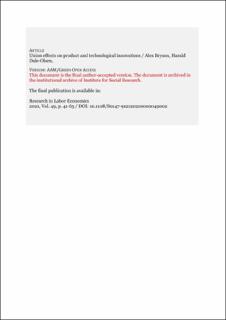| dc.contributor.author | Bryson, Alex | |
| dc.contributor.author | Dale-Olsen, Harald | |
| dc.date.accessioned | 2022-01-18T07:20:56Z | |
| dc.date.available | 2022-01-18T07:20:56Z | |
| dc.date.created | 2021-12-07T15:33:56Z | |
| dc.date.issued | 2021 | |
| dc.identifier.citation | Research in Labor Economics. 2021, 49 41-65. | |
| dc.identifier.issn | 0147-9121 | |
| dc.identifier.uri | https://hdl.handle.net/11250/2837737 | |
| dc.description.abstract | We present theoretical and empirical evidence challenging early studies that found unions were detrimental to workplace innovation. Under our theoretical model, unions prefer product innovation to labor-saving technological process innovation, thus making union wage bargaining regimes more conducive to product innovation than competitive pay setting. We test the theory with population-representative workplace data for Britain and Norway. We find strong support for the notion that local bargaining leads to product innovation, either alone or together with technological innovation. | |
| dc.language.iso | eng | |
| dc.subject | Innovasjon | |
| dc.subject | Innovation | |
| dc.subject | Fagforeninger og kollektive forhandlinger | |
| dc.subject | Trade unions and collective bargaining | |
| dc.subject | Komparativ forskning | |
| dc.subject | Comparative research | |
| dc.title | Union effects on product and technological innovations | |
| dc.type | Peer reviewed | |
| dc.type | Journal article | |
| dc.description.version | acceptedVersion | |
| dc.subject.nsi | VDP::Samfunnsøkonomi: 212 | |
| dc.subject.nsi | VDP::Economics: 212 | |
| dc.source.pagenumber | 41-65 | |
| dc.source.volume | 49 | |
| dc.source.journal | Research in Labor Economics | |
| dc.identifier.doi | 10.1108/S0147-912120210000049002 | |
| dc.identifier.cristin | 1965740 | |
| dc.relation.project | Norges forskningsråd: 295914 | |
| cristin.ispublished | true | |
| cristin.fulltext | postprint | |
| cristin.qualitycode | 1 | |
